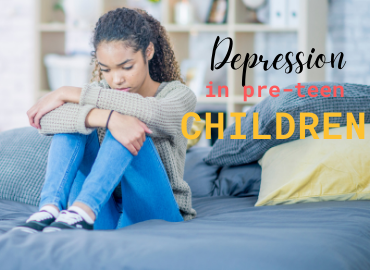Depression in Pre-Teen Children
An Ageless Problem
In this post, when we use the term “depression,” we are using it as a general term for MDD, or major depressive disorder. Depression doesn’t care who the sufferer is, how old they are, or what people see when they look at the sufferer’s life.
Children today live in a very busy world, and though they may be lively and energetic, their minds can become overloaded the mind, which impedes the brain from processing things well and lessening the amount of rest they get.
Circumstances are extremely influential when it comes to MDD and other depressive disorders in pre-teen children. These circumstances include negativity at home, bullies, physical ailments, lack of attention, etc. How do we notice MDD for what it is? How should we, as their friends, parents, siblings, teachers, and caregivers respond?
Approach With a Desire to Understand
It can scare a child when an adult says they need to have a Talk. Children often do not have words for what they’re feeling. They don’t have the life experience to put things into perspective, and when one is a child, one truly lives in the moment.
For instance, young Tom gets a bad grade on a test and feels like his world is over. He begins to act withdrawn, cries often, and seems to take little pleasure in playing with his friends and his toys. His parents are concerned but might not connect his actions to a poor grade.
In another hypothetical situation, young Tina’s parents both work long hours and have little time for her. Tina feels a deep anger inside and begins acting out. She recognizes that her parents pay attention when she acts out. This gets her negative attention, but she knows no way to get positive attention, which frustrates her, makes her resent her parents, and makes her feel like the world has nothing good for her.
Don’t Just Observe, Interact
Ask questions the child can understand. Tim’s parents could ask him what happened before he started feeling upset, what he thinks about when he feels bad, and ask his teacher what they have observed in class. What does Tim feel like getting a poor grade means? Is he scared of consequences? Is he comparing himself to siblings or classmates? Did he work hard and feel like his efforts were for nothing? Does he think this means that he’s a bad student and not the talented, smart child he is? The source of the upset needs to be discovered.
Follow Up and Act
It’s important to change the stimuli that sparked the upset so that the child can learn and observe themselves, as well as feel affirmed that they really have been listened to. That gives them a sense of agency, and that they have the power to speak out and be heard, and that they can change their surroundings because they see the adults doing it. Don’t be passive, especially when someone is mistreating that child. Don’t put the responsibility on them.
Tina’s parents can figure out a way to make sure that Tina feels seen and loved, even if they can’t always be there. Maintaining a close and loving connection while making sure to praise her for behaving well will go a long way.
It Takes a Village
Children will, at times, misbehave. But we believe that there is often much more to the situation than kids “being bad.” Humans respond to environmental stimuli, and nowhere is that shown more clearly than in children. If a child’s mental health does not improve with the removal of negative stimuli, or if their suffering is seriously damaging their ability to enjoy and function in daily life, it is important to seek help. It is not a sign of poor parenting to reach out for professional help. In fact, it is a courageous and caring act.
When seeking professional mental health care for a child, it is important for caregivers to communicate to the child that they are not in trouble, but that this is a special kind of teacher that will help both them and their guardians feel happier and more confident.
Contact us any time with questions. We offer a range of services for minors and adults. If someone is in crisis, call SAHMSA’s 24-7-365 hotline at 1-800-662-4357.





